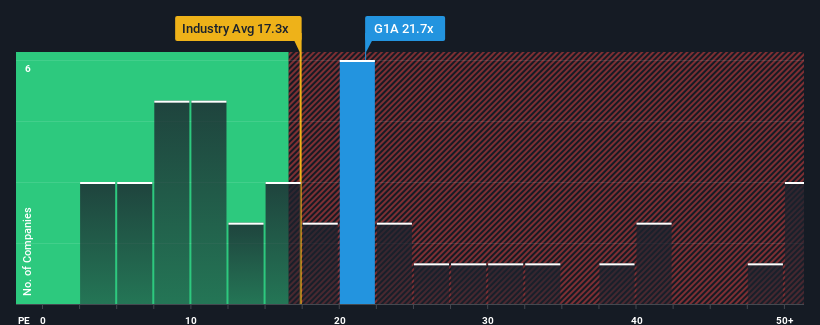Some Shareholders Feeling Restless Over GEA Group Aktiengesellschaft's (ETR:G1A) P/E Ratio
GEA Group Aktiengesellschaft's (ETR:G1A) price-to-earnings (or "P/E") ratio of 21.7x might make it look like a sell right now compared to the market in Germany, where around half of the companies have P/E ratios below 17x and even P/E's below 10x are quite common. Although, it's not wise to just take the P/E at face value as there may be an explanation why it's as high as it is.
GEA Group's earnings growth of late has been pretty similar to most other companies. One possibility is that the P/E is high because investors think this modest earnings performance will accelerate. If not, then existing shareholders may be a little nervous about the viability of the share price.
View our latest analysis for GEA Group

Does Growth Match The High P/E?
In order to justify its P/E ratio, GEA Group would need to produce impressive growth in excess of the market.
Retrospectively, the last year delivered virtually the same number to the company's bottom line as the year before. However, a few strong years before that means that it was still able to grow EPS by an impressive 47% in total over the last three years. Accordingly, shareholders would have probably welcomed those medium-term rates of earnings growth.
Looking ahead now, EPS is anticipated to climb by 13% per annum during the coming three years according to the analysts following the company. Meanwhile, the rest of the market is forecast to expand by 15% each year, which is noticeably more attractive.
With this information, we find it concerning that GEA Group is trading at a P/E higher than the market. It seems most investors are hoping for a turnaround in the company's business prospects, but the analyst cohort is not so confident this will happen. Only the boldest would assume these prices are sustainable as this level of earnings growth is likely to weigh heavily on the share price eventually.
The Key Takeaway
While the price-to-earnings ratio shouldn't be the defining factor in whether you buy a stock or not, it's quite a capable barometer of earnings expectations.
We've established that GEA Group currently trades on a much higher than expected P/E since its forecast growth is lower than the wider market. When we see a weak earnings outlook with slower than market growth, we suspect the share price is at risk of declining, sending the high P/E lower. This places shareholders' investments at significant risk and potential investors in danger of paying an excessive premium.
Many other vital risk factors can be found on the company's balance sheet. Take a look at our free balance sheet analysis for GEA Group with six simple checks on some of these key factors.
Of course, you might also be able to find a better stock than GEA Group. So you may wish to see this free collection of other companies that have reasonable P/E ratios and have grown earnings strongly.
New: Manage All Your Stock Portfolios in One Place
We've created the ultimate portfolio companion for stock investors, and it's free.
• Connect an unlimited number of Portfolios and see your total in one currency
• Be alerted to new Warning Signs or Risks via email or mobile
• Track the Fair Value of your stocks
Have feedback on this article? Concerned about the content? Get in touch with us directly. Alternatively, email editorial-team (at) simplywallst.com.
This article by Simply Wall St is general in nature. We provide commentary based on historical data and analyst forecasts only using an unbiased methodology and our articles are not intended to be financial advice. It does not constitute a recommendation to buy or sell any stock, and does not take account of your objectives, or your financial situation. We aim to bring you long-term focused analysis driven by fundamental data. Note that our analysis may not factor in the latest price-sensitive company announcements or qualitative material. Simply Wall St has no position in any stocks mentioned.
About XTRA:G1A
GEA Group
Produces and supplies systems and components to the food, beverage, and pharmaceutical industries worldwide.
Flawless balance sheet established dividend payer.
Similar Companies
Market Insights
Community Narratives



